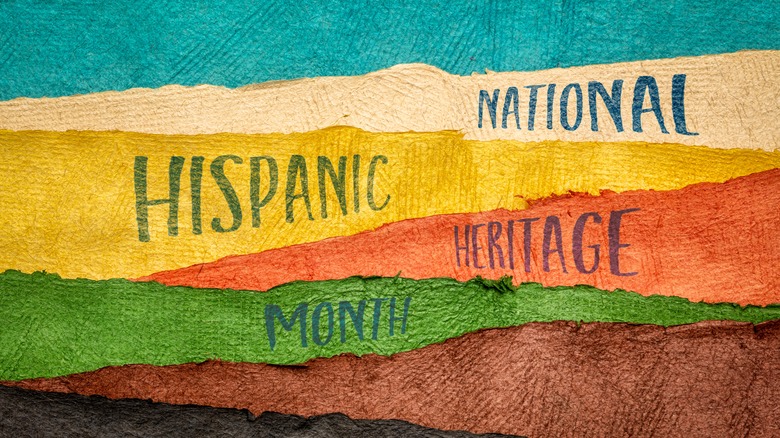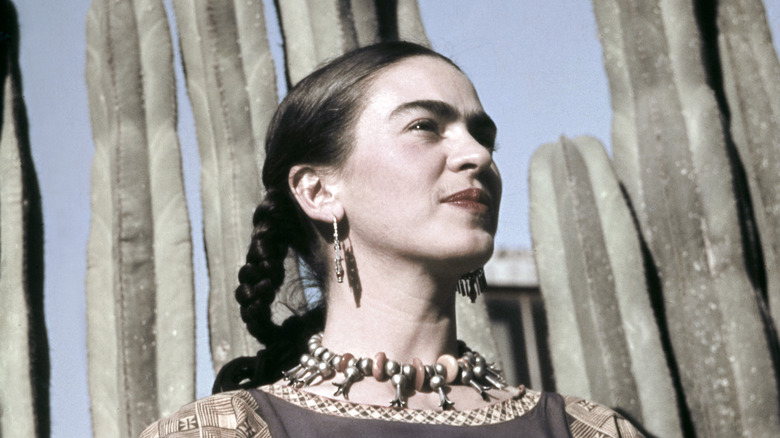The 5 Best Books To Read During Hispanic Heritage Month
Started as a way to celebrate the diversity in the Hispanic community, Hispanic Heritage Month runs from September 15 to October 15 (via National Hispanic Heritage Month). Though it initially began as a week-long celebration in 1968 under President Lyndon Johnson, President Ronald Reagan turned it into a month-long event from 1988 onwards.
This time period is especially important to the Latinx community, as it kicks off with the Independence Day for Costa Rica, El Salvador, Honduras, Guatemala, and Nicaragua on September 15 and marks Mexico's Independence Day on September 16. Two other important Independence Day dates are September 18 for Chile, and Belize on September 21. Finally, Día de la Raza takes place near the end of the month, on October 12. Día de la Raza celebrates the "mixed indigenous and European heritage of Mexico," and is sometimes alternatively known as Race Day or Columbus Day (via Britannica).
During this month, watching films about the Hispanic community and reading books by Hispanic authors is a great way to start exploring Hispanic culture. Whether you're more of a nonfiction fan or prefer to dive into the latest fiction read, there are tons of wonderful Latinx authors that will draw you into their world with spellbinding prose and poetry.
This book is a brutal yet hopeful read of the Latinx immigrant experience
Kicking off the five best books for Hispanic Heritage Month is "Dominicana" by Angie Cruz. Published in 2020, it was shortlisted for the Women's Prize for Fiction and currently has 4.12 stars on Goodreads with almost 30,000 ratings. The novel's main character is Ana, a 15 year old who lives in the Dominican Republic. She marries Juan, a man twice her age, so she can move to New York, hoping one day her whole family can move there with her. However, once in New York, Ana is left to fend for herself in a rundown apartment at the hands of the newly cruel and violent Juan.
The Guardian notes that the book was inspired by Cruz's mother, who apparently didn't believe anyone would be interested in her story. Though it has some jarring topics within, Cruz paints a stunning and ultimately hopeful portrait of what it's really like to be an undocumented immigrant with no money, prospects, or English language skills in the 1960s.
The young adult genre is ideal for teens and college students wanting to learn more
For teenagers, young adult books will help educate about Latinx culture whilst still remaining easy to read. One of the best YA books is "I Am Not Your Perfect Mexican Daughter" by Erika L. Sanchez, as recommended by Insider. The book focuses on a Mexican-American teenager, Julia, who is struggling with the death of her sister. In addition to navigating her grief, Julia is having difficulty coping with what her parents expect from her and the pressure upon her shoulders.
Parade also mentions this book in their list of the best Latinx novels, calling it "all-too-familiar for daughters of Latinx immigrants in the United States." Though it covers tricky topics, the book currently has 4.04 stars on Goodreads from over 50,000 ratings. Its depiction of mental health is real, raw, and will resonate with a lot of teens growing up in similar cultures. It was also a finalist for the National Book Award.
If you are interested in memoirs, this novel is a perfect pick
An engaging and beautiful memoir, "Solito" by Javier Zamora narrates the story of how Zamora emigrated from El Salvador to the United States when he was 9 years old (via Penguin Random House). As stated by Los Angles Times, Zamora, who is also a poet, undertook the harrowing two-month journey to reunite with his parents completely by himself despite his young age.
Though the story is Zamora's, it will heavily resonate with many other immigrants who had to go through similar circumstances to get to the United States. Zamora himself has won several prizes and fellowships for his poetry (via Poetry Foundation), so there's no doubt that his writing will be just as immersive as his previous work. "Solito" was released on September 6, making it a good recent pick for you to read during Hispanic Heritage Month.
Poetry fans will love and appreciate the beauty of this collection
For poetry fans, Natalie Diaz's "Postcolonial Love Poem" won the 2021 Pulitzer Prize for Poetry (via The New York Times). As though the honor of this prize wasn't enough, Diaz is the first Latina author to win the title, meaning she is both creating history and making an impact. The collection is Diaz's second and focuses on how invading powers can erase the culture of a place, a practice which Diaz will not let happen quietly, hence the "postcolonial" in the title. As for the "love poem" aspect, Diaz has conversations with a lover about the history of colonialism and how it impacts her.
A wholly unique read, the book appeared on TIME's "100 Must-Read Books of 2020," earning the descriptors "luminous," "tender," and "striking." It currently has a 4.38 rating on Goodreads from almost 4,500 reviews, and has been called "an anthem of desire and erasure."
This book centers around a well-known icon whose work lives on as part of her legacy
When talking about Latinx icons, Frida Kahlo cannot be left out. A painter and proud Hispanic independent feminist, Kahlo made waves both in the art world and for her huge personality.
Recommended by Good Housekeeping, Arianna Davis' book "What Would Frida Do? A Guide to living Boldly" will inspire you to step up and reclaim your narrative. It contains stories from Kahlo's life that will give you the courage to, as the title says, live boldly. Speaking to Shondaland, Davis said that she admired Kahlo's refusal to censor any part of her life whether it was good or bad, and hoped that this openness would help others come to terms with their own Latinx identity.
No matter where you are from, by delving into one of the above books for Hispanic Heritage Month you're sure to laugh, cry, emphasize, and be blown away by the beauty of Latinx stories.





